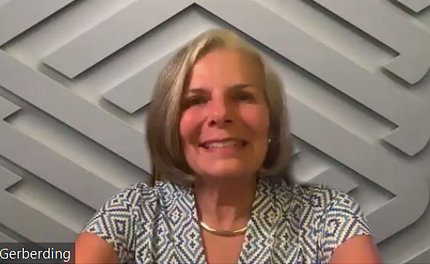NINDS Forum Provides How-to Guidance to Nonprofits

Progress Through Partnership, NINDS’s 16th nonprofit forum, served as a live how-to manual—providing guidance on everything from working with industry, academic and government investigators to finding new ways to fund research to increasing community engagement to attain equity and inclusivity in science.
More than 250 people—including staff representatives and leadership, as well as patient and caregiver members from nonprofit organizations across the country—registered for the virtual meeting.

“The mission of NINDS is to seek fundamental knowledge about the brain and nervous system and to use that knowledge to reduce the burden of neurological disease for all people...and that’s exactly what we do,” said NINDS director Dr. Walter Koroshetz in opening remarks. “There are a lot of challenges with many different disorders, all of which cause a lot of suffering and tragedy for people...We have treatments for some conditions and they’re highly effective, but in general we’re still kind of scratching the surface. So, research is really what will lead to better treatments and that’s what our mission is—to try and get us there.”

The meeting kicked off with a keynote presentation on the Foundation for the National Institutes of Health (FNIH). Newly appointed FNIH CEO Dr. Julie Gerberding gave an overview of the organization, which was set up by Congress to manage research alliances and public and private partnerships in support of NIH. She also provided information on the many initiatives that FNIH manages such as the Accelerating Medicines Partnership (AMP) program. AMP brings together NIH and industry resources to improve understanding of disease pathways and facilitate better selection of targets for treatment.
The 2-day forum featured multiple panel discussions, pre-scheduled one on one discussions with NINDS program staff, and ample networking opportunities.
The “Patient Advocacy in Commercialization” roundtable focused on how nonprofits can work with industry. Panelists explored innovative methods to fund research during a discussion on “Supporting Science as a Small Business.”
During a panel, “Leveraging Progress Across the Scientific Pipeline,” scientific leaders shared their experience and advice on how nonprofits can have robust relationships with researchers at academic institutions.
“We are all here because of our focus on our patients—in my case, ALS patients,” said Dr. Sabrina Paganoni, co-director of the Neurological Research Institute at Massachusetts General Hospital and co-PI of the HEALEY ALS Platform trial—the first platform trial for ALS is the world. “But what really matters is that we are all here together working for the same goal,” she said.

Then-NINDS deputy director Dr. Nina Schor moderated lightning-round talks at the “Engaging Trainees and Early-Stage Scientists” session. She explained that nonprofits can play many roles, even in the space of funding early or mid-career investigators.
“It seems like sometimes you’re actually providing the scientific community with what it needs—fueling their ability to carry out studies that they perhaps wanted to try or fueling new investigators so that you get them off the ground and keep them engaged in what your organization is dedicated to doing,” she said. “But sometimes also you have the opportunity to direct where the field goes by making funding opportunities available that are targeted in some way or that respond to some need of your patient populations and families or of your organization.”
Koroshetz added comments on the importance of training young people in translational research. “The ability to influence and get young people trained in translation, whether it’s through a bootcamp or a disease meeting, is so important in generating the army that is going to solve the problems that we’ve been able to put out on the table,” he said. “When people are looking for a career to make a difference in the world, working on a disease and trying to get a therapy for diseases—there’s not much that’s more rewarding than that.”
Day 2 began with success stories, a yearly favorite. Scientists working with three organizations—the Parkinson’s Foundation, the ReDLat Consortium and Global Brain Health Institute, and the Myasthenia Gravis Foundation of America—shared achievements in reaching critical milestones, including in the areas of diversity, equity and inclusion and making sure the science represents all people.
Dr. Todd Schwedt, vice chair for Neurology Research and medical director of clinical studies at the Mayo Clinic, talked about the important role of patients as partners.
“It’s my belief,” he said, “at least for clinical trials in which patients are being enrolled as participants, that researchers and scientists should no longer be determining the most important clinical research questions or outcomes of interest or methods in isolation. They should be doing it along with patient partners. I believe if we’re asking patients to participate as subjects, we should include patients as equitable research partners.”
Recordings of the forum are available at: https://videocast.nih.gov/watch=45549 (day 1) and https://videocast.nih.gov/watch=45551 (day 2).
For more information, visit https://go.usa.gov/xhrKj.
